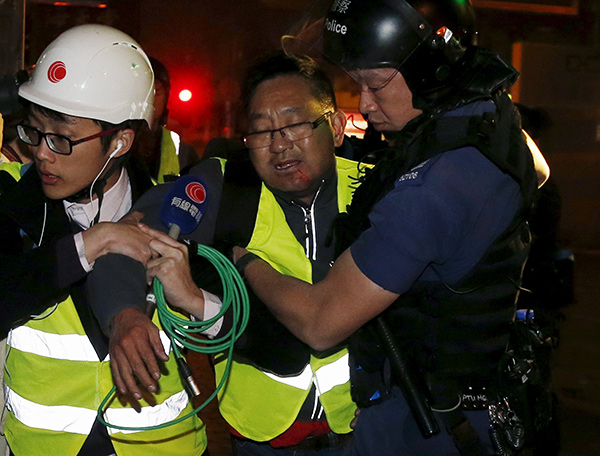 |
|
An injured TV journalist, center, is helped by his colleague and a riot policeman after being hit by a stone thrown by a protester onto his face during a clash at Mong Kok district in Hong Kong, China, Feb 9, 2016.[Photo/Agencies] |
Rioters clashed with the police late at night on Feb 8, the first day of the Lunar New Year, and things escalated and turned bloody in the early morning of the next day, with the rioters deliberately injuring close to 100 policemen. In the process, the police had to fire some warning shots. Worryingly, fires were started in a number of places.
In all fairness, there was nothing particularly special about this riot. After all, this behavior is what radicals do all around the world, and radical localists in the special administrative region have finally caught up with international trends.
The World Trade Organization ministerial conference in Hong Kong in 2005 showed people how ineffective the pepper spray used by police could be against protestors when farmers from the Republic of Korea were sprayed and then just cleaned their eyes with bottled water and charged at the police lines again, after less than a minute.
In other WTO-inspired protests around the world, some demonstrators had gone so far as to burn cars, but in Hong Kong, the protesters did not break a single shop window. The Hong Kong officials congratulated themselves and thanked Hong Kong residents for being more civilized than people in other countries. Today, 10 years after the WTO conference, they realize how wrong they were.
There can be no justification for the riot in Hong Kong. Attacking police officers doing their duty is wrong, period. But condemning such antics is not enough; it must be followed by concrete actions. The worst response is to just verbally condemn the rioters. Instead, the rioters must be made to suffer the consequences of their actions. Most residents are against the erosion of law and order in the SAR. Therefore, everything must be done to nip such extremism in the bud.
First of all, the argument that the riot is a symptom of failed leadership in the city needs countering. This must be done with conviction and determination. Governance in Hong Kong has declined, but this is no excuse for violence. More importantly, the government alone cannot deliver good governance, as it is not an authoritarian society where the government controls everything.
Good governance is the responsibility of everybody-civil society, the courts, the Legislative Council and professional organizations. The government may have some influence over them but it does not have full control. The dissidents want us to believe that simply because there is no universal suffrage the chief executive is responsible for everything which happens in Hong Kong. But clearly this is not the case; power is still highly decentralized in the SAR.
In reality, governance in Hong Kong has deteriorated because much needed reforms have been stalled by endless arguments and filibusters. Consensus needs to be built to move forward, and consensus by definition is not the full realization of what each party wants. Everyone has to accept this and make compromises.
In addition, the government has to take the necessary actions even though that may lead to further controversy. After this riot, the government praised the police for their restraint. This alienates the silent majority because what they want is not official restraint but the firm implementation of the law. The police should use necessary and appropriate force to protect people and property. Police restraint alone is meaningless. It is by no means a virtue. Sometimes, it has been used merely as a justification for not being more decisive in the past.
Most Hong Kong people want the rule of law; they want to see a strong government willing to make tough decisions. Many of the issues which are said to divide residents are in fact not really controversial at all for most ordinary people. It is the media that plays them up as controversial. But Hong Kong residents will not be fooled. Ultimately, Hong Kong must uphold law and implement rational and sensible policies.
The author is a veteran current affairs commentator.

I’ve lived in China for quite a considerable time including my graduate school years, travelled and worked in a few cities and still choose my destination taking into consideration the density of smog or PM2.5 particulate matter in the region.